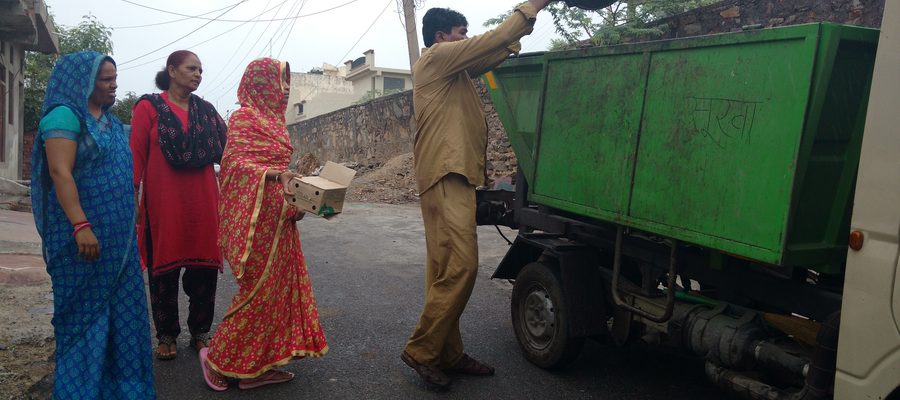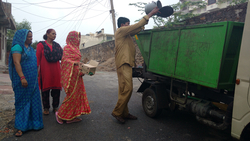Udaipur Commences Segregation at Source under CapaCITIES project

As a part of the CapaCITIES project supported by the Swiss Agency for Development and Cooperation (SDC), ICLEI South Asia along with other partners initiated source segregation of waste in two wards (Wards No. 1 and Ward No 41) in Udaipur city.
In a bid to improve the existing municipal solid waste management practices in the city, Udaipur Municipal Corporation (UMC) aims to introduce and institutionalize the process of collection and transportation of segregated waste in the city to meet the provisions of Solid Waste Management Rules, 2016 and also the larger goals of the Swachh Bharat Mission.
In order to support the city in its larger objective of sustainable waste management, with focus on reduction of GHG emissions from waste disposal, the CapaCITIES team along with the health department of UMC, initiated segregation practices in two wards on a pilot scale. The two wards with approximately 3500 households and commercial entities have been chosen in discussion with the Municipal Corporation. These two wards represent different sections of the city with Ward 1 being densely populated, having an uneven terrain and comprising primarily of lower-income groups while Ward 41 represents a well-planned residential area populated with a higher-income group. As a first step towards the initiative, ICLEI South Asia had conducted recce and preliminary discussion with citizens regarding general waste management practices in their areas. A quantification and characterization study of the two wards followed, to assess the quantity of waste being generated and the composition of waste.
Understanding that segregation is the key to any successful waste processing and disposal practices, it was decided to discuss, sensitize and raise awareness of the public towards segregation. Under the project, two women from local Self Help Groups (SHGs) were hired, trained and capacitated to motivate citizens to practice segregation at their household level. Intense dialogues with citizens and one-on-one meetings with the public in the two wards regarding segregation practices were held last month by officials from ICLEI and SHG representatives. Along with citizens, sanitary staff deployed in the two wards were also trained and sensitized. Presently, more than 50% of households in the two wards are segregating waste into two categories i.e wet (primarily kitchen waste) and dry (recyclables and other non-biodegradable waste) and measures are taken to collect and transport waste separately. The two SHG representatives are usually on the field, monitoring waste collection, to ensure that waste is not mixed during transportation.
The CapaCITIES project aims to support the city in designing and implementing a decentralized waste treatment/processing plant for the segregated biodegradable waste that is collected from the two wards.




